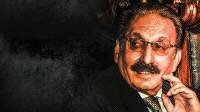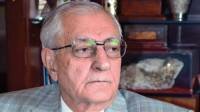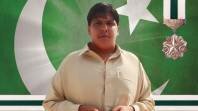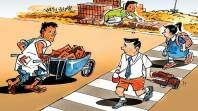There is a reason why President Asif Ali Zardari has a softer spot for Aseefa, his youngest daughter.
Early last year, during a meeting with a foreign delegation, one of the visiting dignitaries praised Hina Rabbani Khar. Aseefa, also present in the meeting, immediately jumped in and reminded the foreign delegation that it was the President’s decision to appoint Ms. Khar as the foreign minister. “The credit should actually go to the political acumen of the President,” a politician familiar with the details of the meeting, recalled her as saying. Aseefa’s prompt presence of mind pleased her father. Bilawal, on the other hand, would have stayed quiet in a similar situation.
Last month, during the oath-taking ceremony of the new Prime Minister, Aseefa tried to play the perfect host. She welcomed the Sharif ladies and helped them get seated. At ease and visibly pleased to be in the spotlight, whispering into the ears of her powerful aunt, Faryal Talpur, Aseefa tried to make sure that the arrangements for the oath talking ceremony went smoothly. Bilawal, on the other hand, was conspicuously absent.
On June 16th, Father’s Day, at around 10 p.m., Aseefa tweeted: “Just had a lovely dinner at Cafe Aylanto with my father #fathersday”
Bilawal’s Twitter feed,perhaps not surprisingly, remained silent.
After former Prime Minister Benazir Bhutto’s assassination in 2007, Bilawal was given the title of Chairman of Pakistan Peoples Party. Making a speech alongside his father in Larkana just days after the assassination of his mother, the young Bilawal seemed destined to play a bigger role in the years to come. As the only male heir, he was to inherit not only the enormous wealth but also the political legacy of his parents.
But after five years, something has changed.
Aseefa, the youngest of the three siblings, has fast emerged from the shadows of the eldest brother as a probable to sit on the throne of her parent’s political dynasty. Whispers are getting louder. Speculation is increasing.
There is uncertainty about the future role of Bilawal. He has done little to mitigate these voices; staying out of the limelight, distant from uncomfortable media questions and prodding. During the run up to elections, Bilawal spent most of the time in Dubai and spoke to his party loyalists through video speeches. Security threats were one of the main reasons that he had to stay away but it was also one of the reasons that Pakistan Peoples Party failed to rally itself.
Bilawal has an uncanny resemblance with his mother. Aseefa resembles her father. Those acquainted and friends with both children say they have vastly different personalities. Bilawal seems burdened by the weight of responsibilities. He is shy, reticent and quiet. Of late, his reputation as a disinterested politician-to-be has grown. “Bilawal is a straight-talker,” said a family friend. “But he does not open up.”
In comparison, Aseefa is louder and livelier. She relishes delivering speeches. She speaks with confidence. She likes taking the lead. She smiles as comfortably, and as widely, as her father. She likes being photographed, greeting foreign leaders alongside her father. She likes to emulate her mother, especially in the way Benazir Bhutto used to dress. And, she can be cold and condescending like her father.
“There is a Zardari streak in her,” said a politician, who declined to be named. “Aseefa can be very rude. I have seen her snubbing senior party leaders.”
Unlike Bilawal and Bakhtawar, the young Aseefa likes pomp and show. She is enamored by protocol -- and insists on it. On the streets of London, where her elder siblings do not mind walking, Aseefa likes to take expensive cabs.
In late 90s, when Mir Murtaza Bhutto returned to Pakistan, he received a frosty welcome from Benazir. He got an even colder reception from the general population but it did not deter his mother, Nusrat Bhutto, from thinking that he could still be the leader. She sided with her son, declaring him as the rightful successor to his father’s legacy. Benazir, who had suffered through jails and collided head on with the martial law authorities in her years of struggle, saw it as an unjust patriarchal move. She resisted. Relations between the two siblings grew distant and never returned to normalcy.
Despite the subtle overtures by President Zardari and whispers within Pakistan Peoples Party that suggest Aseefa is gradually getting into the front seat, imperturbably surpassing her brother, there are no signs of bitter relations between the three siblings.
Publicly, PPP officials and party leaders stress that Bilawal will lead the party and Assefa, despite her enthusiasm, will not replace her brother.
“Both will lead the party jointly and I don’t think that Bilawal lacks interest in politics”, Nadeem Afzal Chan, a former PPP lawmaker and former chairman Public Accounts Committee, said but hinted that at the upcoming death anniversary of Benazir Bhutto in December, President Zardari might formally announce handing over PPP’s command to Bilawal or brother-sister duo.
Presidential spokesperson Senator Farhat Ullah Babar stressed that Bilawal is the official chairman of the party.
“Aseefa too takes interest into political affairs,” Mr. Babar said. “But Bilawal is leading the party and will continue to do so.”






















